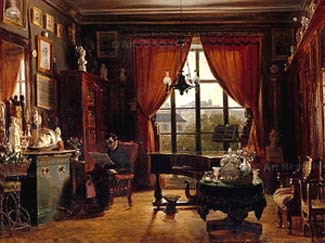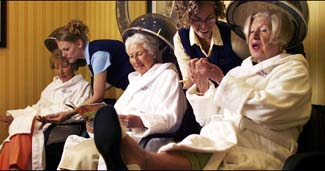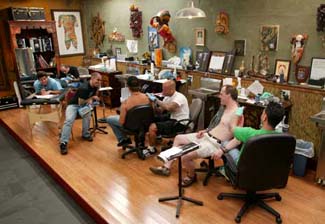The Revolution that seeks to destroy the Church and Christendom works incrementally and in every aspect of society. Sometimes this Revolution is unmasked in a bold step, such as the Protestant Revolt which rejected the legitimate authority of the Church. Often the Revolution’s work is unperceived by the majority. One of these less perceived steps is the gradual degradation of noble ideals. This is evident in the change in the meaning of words and their usage over time.
In fact, the change in the application and accepted meaning of words may serve as a litmus test of the Revolution’s progress. Take, for instance, the word “parlour” or “parlor”. This word, from the French parloir and verb parler (to speak) was used in medieval times to describe the room in a monastery or convent where monks or nuns could speak with visitors. In some cases this usage of ‘parlor room’ in still extant.

A parlor, a room of distinction, in a 19th century apartment in the Square d'Orleans, Paris

The word parlor is demeaned with the modern "beauty parlor"

... and even worse, the "tattoo parlor" |
Later, particularly associated with the Victorian era, the parlor denoted a formal sitting room where the finest household furnishings and decorations were displayed and guests were received. The parlor also typically contained musical instruments and other items with which to entertain the guests. In many cases, the parlor was locked when not in use. It was common to use the parlor for wedding receptions and for preparation of a deceased family member until funeral arrangements were made (i.e.: funeral parlor).
As a personal aside, I recall my grandmother referring to such a room in her home as a parlor. The house was built in 1870 and has been in the family ever since. We grandchildren were asked to not play in this room, and I can still recall the stale air in this shut off and seldom used room. There are certainly many older homes throughout the United States where the term parlor is still used in this way.
With time, new uses of parlor were popularized. We are all familiar with the “ice cream parlor” and “pizza parlor.” Then there is the “beauty parlor,” synonymous with the hair salon (a similar article could be written on this French word’s transformation as well). All of these usages seem innocuous enough. One of the more common contemporary uses of the word is “massage parlor.” Finally, we have the “tattoo parlor.” So we find that we have “advanced” from the visiting room of a convent to the site where the savagery of skin illustrations and body piercing takes place.
Through each new usage of the word parlor, a less elevated image appears before the mind’s eye. Although the old meanings may still linger, their applications become rarer. The same could be said for almost any word of ancient origin, using the word’s medieval meaning as a starting point. The word “altar” comes to mind. Once a magnificent symbol of the greatest Sacrifice possible to God, and adorned in proportion to this Most Holy Sacrifice, the word has come to mean a simple table for many, or worse
There are other examples of the transformation of words from places of honor to the trash heap of political correctness. The word “crusade,” still held in reverence by some of us, now has an ugly connotation for the many... The use of “crusade” in a positive context today is considered an insult to Mohammedanism, for instance. To speak of a crusade as something good might suggest that one religion is superior to another. The word “inquisition” is usually used in a negative context.
There is no end to changed meanings and new catch-phrases when one considers the language of the post-Vatican II hierarchy. “Dialogue”, “Ostpolitik”, “ecumenism”, “renewal” and “aggiornamento” are just some examples from this smorgasbord.
Another observation on the usage of words is that those connoting absolute concepts have been discouraged in recent times. The words “good”, “evil”, “heaven” or “hell” are particularly despised by those who fear dealing with them. Vague, relativistic terms are preferred. It would seem that if evil cannot be clearly defined, then punishment for evil cannot exist. Also, if virtue cannot be identified, then one need not worry about its attainment. Just as Holy Scripture became subject to individual interpretation after the Protestant Revolt, so have the meanings of good and evil. In truth, there can be no such thing as subjective absolutes.
In summary, the current accepted usage of words and their changed applications are symptomatic of how far the Revolution has progressed. Let us do our part to help reverse and crush this powerful enemy, first, by knowing how this process of corruption works, and second, by avoiding usages of words with anti-Catholic or revolutionary meanings.

Posted June 20, 2007
|